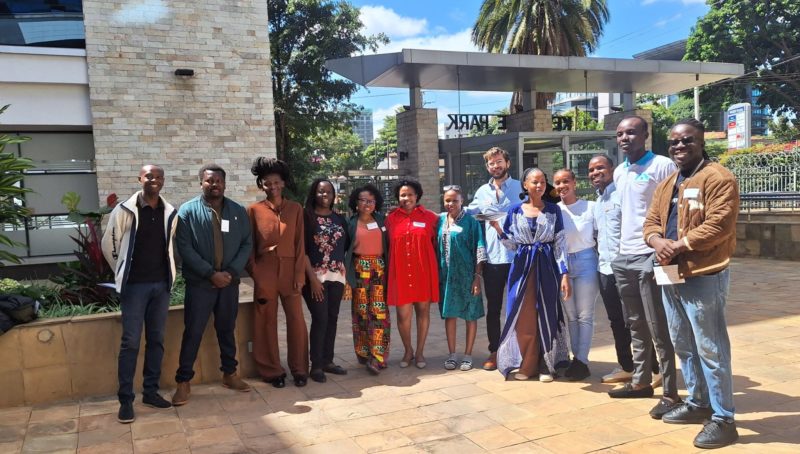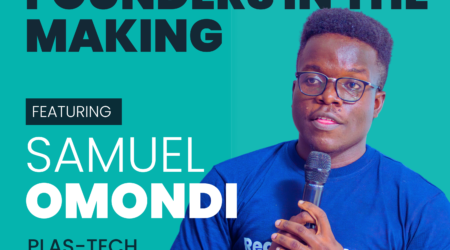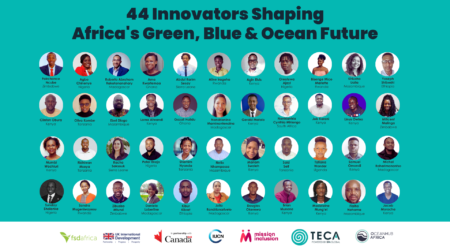TECA’s evolution: Scaling climate resilience across generations

As the world faces the accelerating impacts of climate change, the demand for innovative, scalable climate solutions has never been greater. However, despite the urgent need, many early-stage ventures still face immense challenges in bringing their ideas to life due to lack of funding, limited access to expertise, and the complexities of scaling their solutions. The United Nations has reported that global climate financing must increase by over $6 trillion annually to meet the Paris Agreement’s targets, signaling the scale of investment required to address the climate crisis.
To help bridge this gap, TECA (Triggering Exponential Climate Action), a climate venture launcher and accelerator, has been working with individuals passionate about climate since 2022 with support from FSD Africa to seed sustainable resilience solutions. The first cohort (2022-2023) focused on the Blue Economy, while the second (2024-2025), supported by FSD Africa and the Canadian Government in partnership with The International Union for Conservation of Nature (IUCN) and Mission Inclusion, expanded to include Green Economies. In 2024, TECA launched in México with the support of the Swiss Re Foundation, PayPal, Builders Initiative, Fundación Innovaciones Alumbra, Fundación Coppel, and Nacional Monte de Piedad to incubate and strengthen initiatives around the turquoise economy in Baja California Sur.
At TECA, we support founders at the earliest and often riskiest stages of ideation and remain relentless in our pursuit of bold climate solutions. Each cohort, which we term a wave, offers valuable insights into nurturing ventures that address climate crises and empower the communities most affected. Reflecting on our journey from the Inaugural Diani Wave to the current African Blue Wave & Regen Wave, we’ve embraced key changes and pivots that have deepened our impact and prepared us for the challenges ahead. Below are some key takeaways from what we’ve learned along the way.
Moving from ideation to solid prototypes with user insights
From the three waves implemented, our founders have been able to create startups across sectors such as fintech and climate tech. With a survivorship rate of 85%, higher than the sub-Saharan startup average, it highlighted the importance of starting strong with brilliant and resilient founders. Beyond survival, our focus has shifted to driving faster scaling and fostering the next wave of innovation. In line with this, we recognized the value of supporting slightly more advanced early-stage founders with companies that have tested potential users with a prototype and have precise support needs. This approach accelerates implementation and broadens the pool of investable ventures.
Building founder resilience
Building on the lessons from Wave 1, our latest waves (2nd and 3rd, running concurrently) launched 10 ventures across Africa: seven in the Blue Economy and three in the Green Economy. These startups drive transformative change in resilient fisheries, renewable energy credits, plastic recycling, sustainable healthcare, and climate monitoring. Among these was a standout team, Altruistech, led by the youngest co-founder in our program, an 18-year-old from Sierra Leone, and the oldest, a 42-year-old from Ghana, with a 25-year-old CEO in Rwanda steering the ship. Their journey exemplifies the complexities of leadership in Pan-African startups, particularly in navigating generational and cultural differences, a challenge explored through our leadership coaching initiatives. In Waves 2 and 3, leadership coaching was integrated from the design stage, with a tailored Team Architect engagement, providing a strategic and hands-on approach compared to the first wave, where this was introduced later. This shift has been instrumental in fostering traction, navigating storming phases, identifying early red flags, and ensuring venture success.
Spurring innovation at different levels of the ecosystem
Based on our experience in Africa, we ventured into Mexico to implement a new wave focused on ventures creating positive social and environmental impacts in coastal marine ecosystems. The wave comprises NGOs, cooperatives, and startups.
This hybrid approach was shaped by the local market’s strengths: a robust network of NGOs dedicated to conservation and social impact but struggling to scale, paired with limited entrepreneurial activity. By helping NGOs commercialize their solutions, we’re transforming them into self-sustaining entities. Simultaneously, we’re cultivating a startup pipeline to drive private-sector innovation.
The ten selected organizations represent a fusion of grassroots expertise and scalable business models. This bold experiment lays the groundwork for a new way to catalyze climate action and highlights our shift toward testing different models. The African Wave covered 12 pan-African countries based on the quality of the applicants. In contrast, the current Mexico wave has been geographically focused on a specific region, Baja California Sur, aiming to focus on profound ecosystem impact rather than cross-boundary synergies.
Making smarter moves with smarter funding
Innovation requires appropriate and timely funding. That’s why we introduced a multi-tranched, deliverable-based model for recoverable grants. By tying disbursements to milestone achievements, we minimize risk while maximizing accountability. In the Africa Blue Wave & Regen Wave, we also focused on disbursing earlier sourced topic-specific additional funding related to tech-focused and gender-sensitive business models, female leadership, and AI and web3 applications. This funding has been essential for boosting runway and company progress and allowing the companies to test out pilot variations with support and a level of security to refine & improve their solutions. This approach empowers founders to focus on incremental progress, creating a win-win for entrepreneurs and donors.
Simple, Short-term Wins with Sustainable Impact
Tracking tangible outcomes remains central to our mission. In our latest waves, we sharpened our focus on Adaptation, Biodiversity, and Carbon (ABC) metrics, ensuring every venture significantly contributes to resilience and environmental sustainability. One example is a strategic pivot of Sunwave in Tanzania: initially focused on high-tech freezers, the team pivoted to solar-powered ice machines tailored to small-scale fish markets. The solar technology addresses the inconsistency of diesel-based power supply in the region. At the same time, focusing on a simple ice solution has allowed them to serve low-income users better, boosting incomes for fishers and sellers, reducing food waste, and delivering measurable carbon savings. Our TECA Global Deputy Director, Tyler Ferdinand, often says that a great founder starts with a skateboard, not a car. Starting from the basics makes it more attainable, and as the venture grows, it can evolve into a scooter, a four-wheeler, and beyond. By making a difference at various stages in the lives of vulnerable communities, founders can create meaningful change rather than waiting for a more significant investment to get things moving.
Fertilizing the smallest seeds with cash and AI: Lessons from pre-TECA events
When we start TECA in a new market, we typically employ two methods for activating the innovation ecosystem: 1) a “wave seeding” event that gathers relevant investors, donors, and expert stakeholders to co-design the focus of the wave, and 2) a TECAthon or a hackathon for TECA related solutions to identify promising talent pipelines. Thus far, we have held such events in Santiago, Mumbai, Bogota, Cape Town, Nairobi and Lagos.
Initially, these were meant for just activating partners and visibility for the wave, but with each iteration, we were able to create a model that has an impact, even before the core program starts. Coupling a small amount of seed funding with rapid skill building through personalized generative AI tools, participants in our TECAthons have actually been able to build companies with real customers based on ideas pitched at the event. From seaweed-based jewellery and wild-harvested skincare products to profitable home composting services that facilitate sustainable waste management and reduce environmental footprints, we have seen that our methods for rapid entrepreneurial skill-building have had a real impact. Considering what we can seed in a weekend, imagine the magic that happens after 9 months.
Ecosystem change through TECA: Impact from Inagura Diani Wave to the current African Blue Wave & Regen Wave
Through TECA, we aim to drive meaningful ecosystem changes that foster collaboration, intergenerational learning, and the growth of climate resilience solutions. As we expand with each new wave, we see the increasing power of intergenerational synergies among the founders and fellows, each contributing unique experiences and perspectives. This intergenerational exchange has been our program’s cornerstone, fostering knowledge-sharing and practical collaboration. For instance, during the Africa Blue Wave, fellows developing fish-feeding solutions engaged in insightful discussions with a founder from the inaugural Diani Wave specialising in fisheries. These conversations, enriched by input from past fellows and founders, provided valuable recommendations to peers and guided potential candidates in applying for the program. Beyond knowledge-sharing, these connections have also led to tangible collaborations. For example, a Wave 2 fellow who did not transition to the founder stage, has been actively contributing services as a consultant through software development for several companies from the current and previous waves. This highlights how the program fosters an ecosystem where expertise and services continue circulating, strengthening the impact across cohorts and more extensive across the continent.
TECA has played an instrumental role in continuing to grow the ecosystem, with participants creating solutions and working within organizations that build climate resilience. The program is about more than just those who secure funding; it’s about the influence, learning, and career development of all involved. The experience equips participants to address climate change and develop long-term climate resilience strategies, ensuring that the impact extends beyond securing capital.
What’s next?
As we transition to even more waves, we’re scaling proven successes while continuing to experiment boldly. TECA’s hybrid models, milestone-driven funding strategies, and leadership development programs have proven their impact. As we look to the future, we’re eager to continue innovating on the edge.
Our next steps include integrating even more creative blended financial mechanisms that work for early-stage ventures, forming unique partnership models to provide services to the poorest and climate vulnerable, and working deeper in single countries such as Rwanda and Nigeria to build more substantial, broader bases for climate innovation ecosystems. As we build the ecosystem in Mexico, we’ve also returned our gaze to the east, thinking about how to focus on innovations for extreme heat in India, for example. By scaling the most promising components of our model while leaving room for bold experimentation, we aim to deliver climate solutions where they’re needed most. Contact us to explore partnership opportunities



